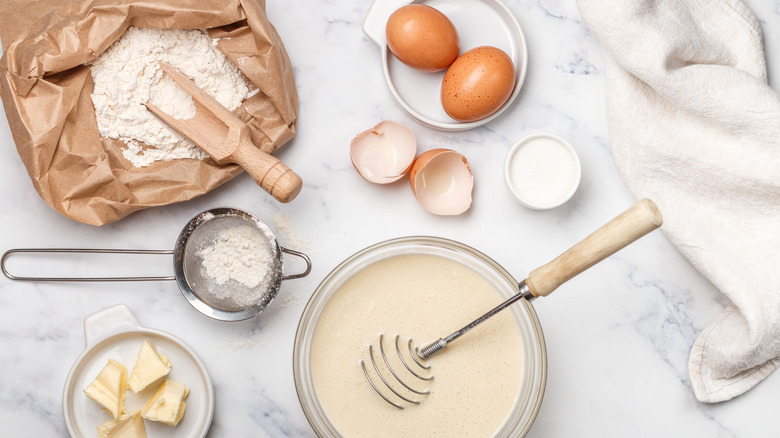Follow This Duff Goldman Egg Tip For Better Baking
If you consider yourself a remotely decent baker, chances are you know all about the golden rule of baking — using room-temperature ingredients. For impatient bakers on a bit of a time crunch, though, it may seem like a frivolous and entirely unnecessary step. How much difference can chucking in a slab of cold butter or breaking an egg straight out of the fridge really make? The answer, in short is, A LOT.
Besides, when pastry king Duff Goldman himself warns against using cold eggs, it's probably best to listen. The Charm City Cakes owner told People magazine that if you've planned ahead on baking something the next day, it's a good idea to leave your eggs out of the refrigerator all night. While you're sleeping, the eggs will gradually come to room temperature and "won't seize up when mixed with the butter."
Even better, he adds, room-temperature egg whites are fluffier when whipped as compared to cold egg whites. Taste of Home also suggested that room-temperature egg whites, when beaten, become way more soft, light, and voluminous than cold eggs. So if you're baking something that depends on beaten egg whites — say meringues, soufflé, and Japanese pancakes — you might want to take Duff Goldman up on his advice.
Room-temperature eggs make lighter and fluffier cakes
As chef and chocolate Jacques Torres explains, the science behind using room-temperature eggs is that when the egg whites are whipped into a soft white fluff, the air trapped inside expands under the heat of the oven, leaving pockets of air in your cakes (via Food Network). Use cold eggs, and you'll have a flatter cake that's denser than the soft and fluffy sponge you want.
In fact, Torres even went on to test the theory and baked a chocolate cake with room-temperature eggs. The room-temperature egg and sugar mixture started bubbling in 10 seconds using an electric mixer and turned into a mountain of fluff in three minutes. Another thing to keep in mind, he says, is that if you're using warm and melted liquids like butter and chocolate, cold eggs can start hardening the warm liquid, which will then form lumps in your batter.
If you've forgotten the Duff Goldman rule of leaving eggs out of the refrigerator overnight, Jacques recommends leaving them outside for at least 30 minutes. If that too sounds like too much of an ask, you can bring cold eggs to room temperature by plopping them in a bowl of warm water for a few minutes.

